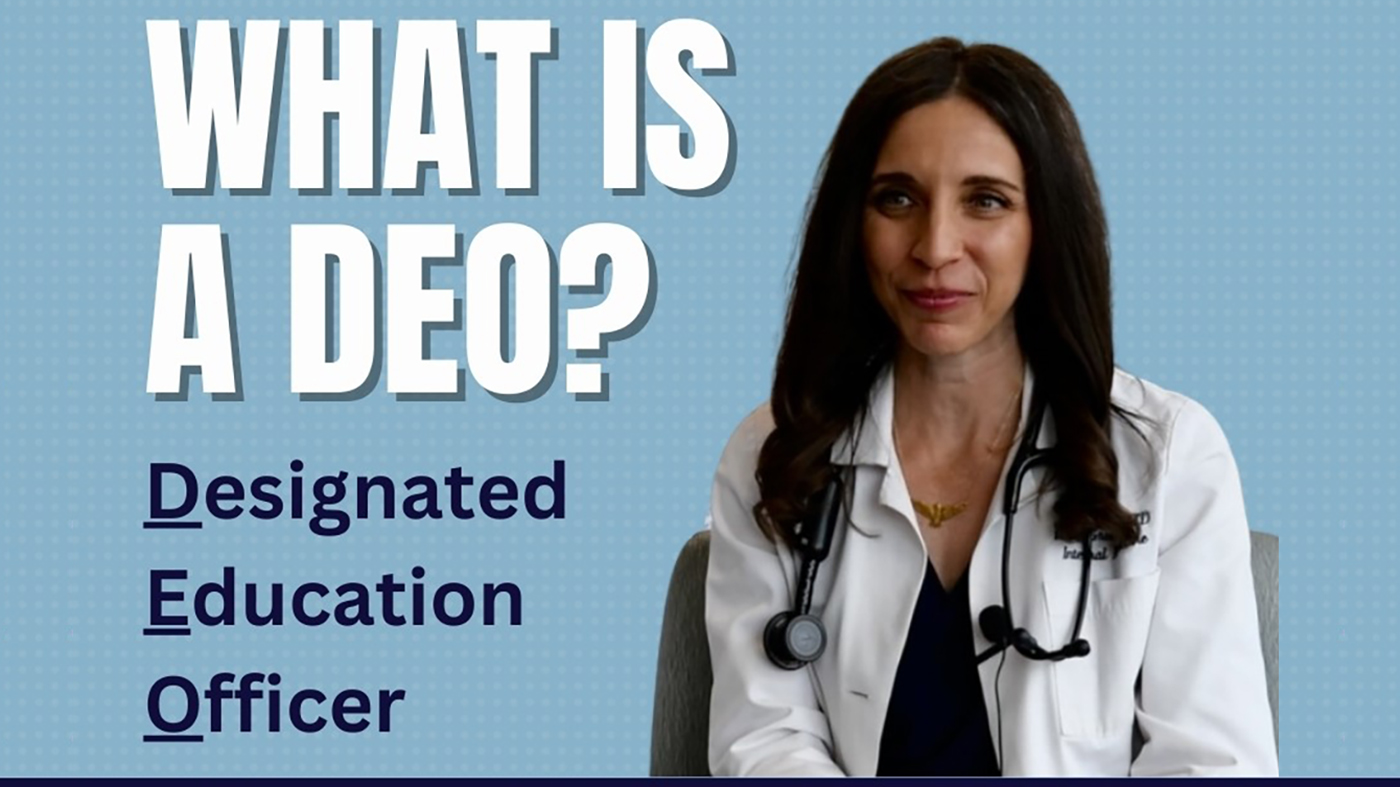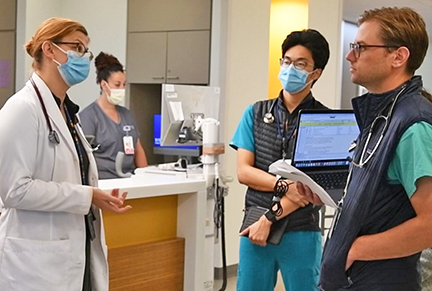Designated education officers play a key role in advancing health care for Veterans. Working within the bustling setting of VA medical centers is one of the most influential players in advancing health care for Veterans and just maybe one of VA’s best kept secrets.
The designated education officer (DEO), typically known as the associate chief of staff for education, is a leader at each VA facility who is responsible for the training and education of health professions trainees. DEOs are essential to VA’s statutory education mission, coordinating affiliation agreements with medical schools, universities and colleges, and overseeing training programs from more than 60 clinical disciplines.
VA’s education mission was established more than 78 years ago with the goal to educate for VA and the nation, but also to increase Veterans’ access to care and the quality of care that they receive. VA Health Professions Education is centrally administered by the VA Office of Academic Affiliations (OAA).
Essential to the success of the education mission are the DEOs across the nation who coordinate VA training for 120,000 health professions trainees (HPTs) annually at 150 medical centers, in collaboration with training directors, faculty, medical schools and accreditation agencies.
“What I love most is taking care of Veterans.”
Dr. Irene Grundy, DEO at New Orleans VA, believes she is fortunate to serve Veterans in her role as DEO. “I love being a DEO. I think it’s the best job in VA. My position allows me to initiate influential, meaningful and hopefully sustainable changes in medical education. But what I love most is taking care of Veterans and teaching trainees at the bedside.”
Grundy (pictured above) believes the transformation of trainees as they nurture their clinical experience is the most rewarding part of her job. “It’s a beautiful thing to watch the trainees grow in their clinical skills. My goal is for all trainees to have an incredibly enriched clinical experience that teaches them the nuances of caring for Veterans,” Grundy said.
Last academic year, New Orleans VA trained a total of 2,320 HPTs at their medical center. “We are one of the larger graduate medical education (GME) programs in VHA and we have a large training portfolio. We are unique in that we have two strong academic institutions that flank the New Orleans VA and we have strong symbiotic relationships with both,” she said.
Additionally, New Orleans VA hosts 50 different GME programs and the facility is focused on expanding its educational footprint, particularly in associated health disciplines.
Dr. Randolph Roig a key player
“We currently have trainees rotating in social work, psychology, pharmacy, dietetics, audiology, physical therapy, occupational therapy, speech therapy, radiology technology, prosthetics, optometry and all nursing disciplines. We have focused on expanding our Bachelor of Science in Nursing (BSN) programs and currently have seven BSN nursing affiliates, including two minority-serving institutions,” Grunday said.
The strength of the program can be attributed to many supporters, but she listed New Orleans VA Chief of Staff Dr. Randolph Roig as a key player in developing the program. “Dr. Roig is an incredible advocate for education and is well-respected by all our academic affiliates. Having such great mentorship from him as well as OAA made for a very smooth transition when I began in my role as DEO.”
A typical day for a DEO can cover a wide array of tasks and planning, including advocating for educational programs and resources, reviewing data, onboarding HPTs, ensuring appropriate HPT oversight, participating in affiliate meetings, engaging with site directors and trainees, clinical work and teaching.
“I love functioning as a liaison and voice for the academic affiliates and trainees. I enjoy the connection with the affiliate leadership, staying current and creating innovative ideas for growth,” Grundy said.
The strength of the educational programs absolutely influences the quality of care provided to Veterans. “We are training a generation of health care professionals in the nuances of Veteran care that will continue to care for Veterans in all genres of the clinical spectrum. This will have an indelible impact on the quality and safety of Veteran care now and for the next generation,” Grundy added.
With DEOs leading the charge in building strong academic partnerships and a steadfast commitment to improving Veteran care, the future is bright for the educational mission of VA. For more information on VA’s education mission, visit the OAA website.
Topics in this story
More Stories
Pacific Islands VA has opened a new urgent care clinic inside the Daniel K. Akaka VA Clinic.
From one battle to the next, including four types of cancers, Eliot Winokur’s resilience remains unshaken.
As severe weather threatened Mississippi, local news warned of a dangerous outbreak of tornadoes. A VA nurse stepped up.







We had 3 individuals on a base inferring they were education servicing personnel on Tricare matters and Medicare relationship. It was later learned they were getting retirees in to Humana USAA honor program or insurance. They were told to leave. Would there activity be called or designated as a DEO?